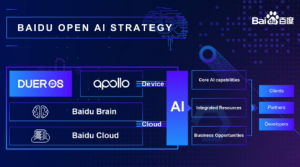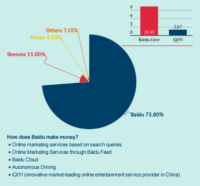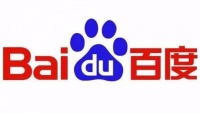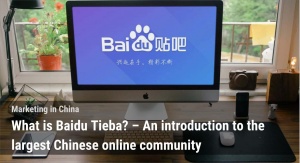Difference between revisions of "Baidu"
| (100 intermediate revisions by 3 users not shown) | |||
| Line 17: | Line 17: | ||
}} | }} | ||
| − | '''Baidu''' (NASDAQ: BIDU) is | + | '''Baidu''' (NASDAQ: BIDU) is a Chinese technology and Internet-integrated services company whose flagship product is Baidu.com, the largest Chinese search engine.<ref>''Baidu'' [http://home.baidu.com/ "About Baidu"]</ref> Its name was originated from the poem Qinyuan by Qiji Xin in Song dynasty. <ref> Qiji Xin [https://zh.wikisource.org/wiki/青玉案_(辛棄疾) Qinyuan] </ref> Baidu employs thousands of research engineers to work on advanced search engine Hyperlink technology, which gives Baidu access to cutting-edge science and core technology. In part due to Baidu, China has joined the United States, Russia, and South Korea as one of the few countries with domestically-developed search engine core technology. In recent years, Baidu has faced criticism for their data mining and targeted advertising practices, which were catalysts for an increased amount of debate surrounding the ethical implications of online advertising and privacy.<ref>http://patft.uspto.gov/netacgi/nph-Parser?Sect1=PTO1&Sect2=HITOFF&d=PALL&p=1&u=%2Fnetahtml%2FPTO%2Fsrchnum.htm&r=1&f=G&l=50&s1=5,920,859.PN.&OS=PN/5,920,859&RS=PN/5,920,859</ref> |
==History== | ==History== | ||
| − | [[File:Robin.li .jpg|200px|thumb|right|Robin Li at NASDAQ]] | + | [[File:Robin.li .jpg|200px|thumb|right|Robin Li at NASDAQ. Sourced from Seeking Alpha<ref name="seeking_alpha"></ref>]] |
| − | In 1994, [[Wikipedia: Robin Li|Robin Li]] (Yanhong Li, 李彦宏) joined IDD Information Services, a New Jersey division of Dow Jones and Company, where he helped develop software for the online edition of The Wall Street Journal.<ref>[http://www.taipeitimes.com/News/bizfocus/archives/2006/09/17/2003328060 Robin Li's vision powers Baidu's Internet search dominance Archived February 3, 2011, at the Wayback Machine], ''Taipei Times'', September 17, 2006.</ref> | + | In 1994, [[Wikipedia: Robin Li|Robin Li]] (Yanhong Li, 李彦宏) joined IDD Information Services, a New Jersey division of Dow Jones and Company, where he helped develop software for the online edition of The Wall Street Journal.<ref>[http://www.taipeitimes.com/News/bizfocus/archives/2006/09/17/2003328060 Robin Li's vision powers Baidu's Internet search dominance Archived February 3, 2011, at the Wayback Machine], ''Taipei Times'', September 17, 2006.</ref> Li also worked on developing better algorithms for search engines and remained at IDD Information Services from May 1994 to June 1997. |
| − | At the end of 1999, Li saw the great potential of China's Internet | + | [[File:zhongguancun.jpg | 200px|thumb|left|Zhongguancun at night. Sourced from Global Times.<ref name="global_times">Büchenbacher, K. (2018, June 28). How China’s economic reforms made way for Zhongguancun – China’s Silicon Valley - to become a transnational innovation hub. Global Times. https://www.globaltimes.cn/content/1108701.shtml</ref>]] |
| + | At the end of 1999, Li saw the great potential of China's emerging Internet sector. Li resigned from his job, brought patented search engine technology, and founded Baidu Inc in [[Wikipedia: Zhongguancun| Zhongguancun]], often referred to as "China's Silicon Valley", on January 1, 2000. Within one year of its founding, Baidu launched its flagship independent search portal baidu.com. Li's original intention was to create a product to "provide the best and most equitable way for people to find what they are looking for".<ref>''Baidu'' https://baike.baidu.com/reference/427116/74a23gpaBp1id7YOJTojsNSLYPiEFfKSdcxZ0sklG0MySaqCIrIVDI7sfDGNypGBR5cWQCy5R8-1HuQnhQDoSt7thhMetJlF ''BaiKe.''</ref> This feat was accomplished as a result of Baidu's [[Wikipedia: Hyperlink|link analysis]] technology, which sorts search results based on how many connections they have with other pages. This algorithm was based on the assumption that the more times a page is linked from another site, the more credible it is. | ||
| − | + | [[File:wangpan.jpg|200px|thumb|right|Baidu Wangpan. Sourced from TechInAsia.<ref name="tia">Millward, S. (2012, March 23). Baidu Takes Aim at Dropbox, Microsoft’s SkyDrive, With New Cloud Storage Service. TechInAsia. https://www.techinasia.com/baidu-cloud-storage-service</ref>]] | |
| + | In 2003, Baidu surpassed Google and became the largest search engine for Chinese netizens. According to data from Analysis International, Baidu currently holds a respectable market share of 58%, well above Google's 33%. <ref>[https://www.technologyreview.com/2018/12/19/138307/how-google-took-on-china-and-lost/ How Google took on China—and lost]. ''MIT technology review'', 19 December, 2018.</ref> Building on its early success, Baidu rapidly expanded by producing new suites of products and acquiring new companies in many different markets. These products include [[Wikipedia: Baidu Baike|Baidu Baike]] (an online encyclopedia), [[Wikipedia: Baidu Wangpan: Baidu Wangpan]] (a cloud storage service), and [[Wikipedia: Baidu Tieba| Baidu Tieba]] (a keyword-based discussion forum), among others. | ||
| − | Baidu's initial public offering occurred on August 5, 2005. At its IPO price of $27 a share, the company raised $109 million. | + | [[File:baidu_nasdaq.jpg|200px|thumb|left|Baidu's NASDAQ launch. Sourced from the New York Times.<ref name="nyt_nasdaq">Barboza, D. (2006, September 17). The Rise of Baidu (That’s Chinese for Google). The New York Times. https://www.nytimes.com/2006/09/17/business/yourmoney/17baidu.html</ref>]] |
| + | Baidu's initial public offering occurred on August 5, 2005. At its IPO price of $27 a share, the company raised $109 million. On the first day of trading, Baidu's stock price rose by 354%, the 18th highest gain in history and the highest gain by an overseas company.<ref name="seeking_alpha">[https://seekingalpha.com/article/157809-the-untold-story-of-the-baidu-ipo The Untold Story of the Baidu IPO] ''Seeking Alpha''. Archived from the original on October 24, 2016. Retrieved September 8, 2019.</ref> In December 2007, Baidu became the first Chinese company to be included in the NASDAQ-100 index. As of May 2018, Baidu's market cap has risen to US$99 billion.<ref>[https://www.latimes.com/archives/la-xpm-2007-dec-10-fi-baidu10-story.html Search site moves at the speed of China]. ''Los Angeles Times''. Archived from the original on January 22, 2012. Retrieved November 26, 2011.</ref> | ||
==Name, Mission, and Vision== | ==Name, Mission, and Vision== | ||
| − | The word "Baidu" comes from Xin Qiji, a | + | The word "Baidu" comes from Xin Qiji, a Southern Song Dynasty-era poet who lived and wrote eight hundred years ago. <ref>''Baidu'' https://ir.baidu.com/company-overview/ "Company Overview" </ref> In a famous poem, Xin Qiji wrote: "Having searched hundreds of times in the crowd, suddenly turning back, he is there in the dimmest candlelight." The meaning of "Baidu" is "searching for hundreds of times", which matches the enterprise's position as a search engine company and its resolution to make their search engine the top in the world. |
| − | Baidu's mission is to "make the complicated world simpler through technology" and its vision is "to be a top global technology company which best understands | + | Baidu's mission is to "make the complicated world simpler through technology" and its vision is "to be a top global technology company which best understands users' needs and enables their growth". |
| − | ==Baidu | + | ==Baidu Brain== |
| − | Baidu | + | Baidu Brain is Baidu's AI core technology engine, including vision, speech, natural language processing, knowledge graphs, deep learning, and other AI core technologies and AI open platforms. Baidu Brain supports all Baidu's businesses internally and is open to the outside world to help partners and developers accelerate the application of AI technology, and empower industry customers through DuerOS, Apollo, and Baidu Smart Cloud.<ref>''Baidu Baike'' [https://baike.baidu.com/item/%E7%99%BE%E5%BA%A6%E5%A4%A7%E8%84%91/13333434?fr=aladdin "Baidu Brain"] Retrieved March 19, 2021</ref> <ref>''Baidu Research''. Jan 13, 2021. [http://research.baidu.com/Blog/index-view?id=149 "2020 Retrospective: Baidu's AI Innovations"] Retrieved March 19, 2021</ref> |
| + | [[File:Baidu Brain.png|300px|thumb|right|Overview of Baidu Open AI Strategy <ref> ''Baidu Inc.'' Feb 6, 2018. [https://twitter.com/baidu_inc/status/960936477348843522 "Baidu Open AI Strategy"] Retrieved March 19, 2021 </ref>]] | ||
| − | === | + | ===DuerOS=== |
| − | + | DuerOS is a cross-platform voice assistant service with an installed base of over 400 million and monthly voice queries reaching 3.2 billion in June 2019. With a network of over 300 partners, DuerOS is installed on smart devices, smartphones, children's watches, and story machines. Baidu released four DuerOS-powered Xiaodu Branded smart devices in 2018, including Xiaodu smart speaker and Xiaodu smart display, the first smart speaker in China with a display. Equipped with over 1,000 skills in genres such as education, cooking, gaming, and entertainment, the DuerOS skills store has been released for test trials. <ref name='AI business'>''Baidu''. [https://ir.baidu.com/index.php/Baidu-Core "Baidu Core: Search and feed"] Retrieved March 19, 2021</ref> | |
| − | + | ===Apollo=== | |
| + | Apollo is Baidu's open-source autonomous driving platform. It supports the commercial production of autonomous driving vehicles and incorporates autonomous driving capabilities. It helps to provide AI solutions in areas such as traffic flow, air pollution, and road hazards. <ref name='AI business'></ref> | ||
| − | + | ===Baidu Cloud=== | |
| + | Baidu Cloud provides AI solutions, cloud infrastructure, and other services to enterprises and individuals. Its primary goal is to offer a comprehensive set of products, services, and tools to enable enterprises to improve productivity and operational efficiency through the use of Baidu AI and cloud infrastructure. Baidu Cloud offers general and industry-specific AI solutions, serving industries, including financial services, media, gaming, and telecommunications, while supporting internal usage. <ref name='AI business'></ref> | ||
| − | + | ==Baidu Products== | |
| − | *''Baidu | + | ===International=== |
| + | *''[[Wikipedia:Baidu Translate | Baidu Translate]]'', an online translation service originated in February 2013.<ref>https://www.apkhere.com/app/com.baidu.baidutranslate </ref> As of April 2020, it supports 200 languages, the most out of any online translation service, to help fight against COVID-19.<ref>https://twitter.com/baiduresearch/status/1248316242689019904</ref> | ||
| − | * '' | + | ===Online Video Platform=== |
| + | *''[[Wikipedia: iQIYI | iQIYI]]'' is a leading internet video streaming service owned by Baidu. The video service platform provides its users a comprehensive library of professionally produced content, as well as user-generated content. <ref>''iQIYI''. [https://ir.iqiyi.com/corporate-profile "Company Overview"] Retrieved March 19, 2021</ref> | ||
| − | + | *''Haokan'' is a short video app, offering a wide variety of user-generated and professionally produced content often in coordination with multiple platform networks. Haokan allows video content creators to distribute their content freely to build a fan base and receive revenue shares for their content contribution. <ref name="AI business"></ref> | |
| − | + | ||
| − | + | ===Baidu Input Method Editor=== | |
| + | Baidu IME is a Chinese-language mobile keyboard that uses Baidu AI to improve input accuracy, remember corrections, and provides a personalized dictionary of new or uncommon words. The input editor includes advanced features like extended voice input, voice message translation & modification, smart punctuation recommendation, and contextual speech detection. Users can create personalized emojis with Baidu IME's augmented VR function. <ref> ''Baidu Inc.'' (2018). [https://www.sec.gov/Archives/edgar/data/1329099/000119312519076779/d657854d20f.htm "United States SEC Form 20-F"] Retrieved April 16 2021 </ref> | ||
| + | ===Baidu Maps=== | ||
| + | Baidu Maps is a desktop and mobile map service provided by China's online search giant Baidu Inc. <ref>Zhu, W.Q. (Nov 29, 2016). [http://www.chinadaily.com.cn/business/tech/2016-11/29/content_27510421.htm "Baidu maps out global expansion"] ''ChinaDaily.'' Retrieved April 16, 2016 </ref> It provides location information, intelligent routing, and navigation by collecting available travel options and route timings. Baidu Maps also provides accessibility services such as voice assistance, which allows for voice activation, multi-round conversations, and complex commands. <ref>Lee, M. (Jul 06, 2012). [https://www.bloomberg.com/news/articles/2012-07-05/apple-shares-google-china-map-partner-in-win-for-autonavi "Apple Shares Google China Map Partner in Win for AutoNavi: Tech"] ''Bloomberg.'' Retrieved April 16 2021 </ref> | ||
| − | == | + | ==Advertisements== |
| − | + | Baidu provides online marketing services to a diverse customer base that consists of small and medium-sized enterprises(SMEs), large domestic businesses, and multinational corporations. The defined industries include retail, personal care, medical and healthcare, franchising, financial services, education, online game services, auto/logistics, real estate, and home furnishing, and business services. <ref name='AI business'> </ref> | |
| − | + | [[File:Baidu business model.png|200px|thumb|right|Bar chart showing Chinese search market share <ref>Cuofano, G. (n.d.) [https://fourweekmba.com/baidu-business-model/ "The Google of China: Baidu Business Model In A Nutshell"] ''FourWeekMBA'' Retrieved Apruk 16 2021</ref> ]] | |
| − | + | ===Pay for placement (P4P)=== | |
| + | Baidu's P4P services allow customers to bid for priority placement of paid sponsored links and reach users who search for information related to their products or services. <ref name='AI business'> </ref> Customers may use Baidu's automated online tools to create text-based descriptions of their web pages and bid on keywords that trigger the display of their links and web page information. <ref> ''Baidu'' (Nov 18, 2008). [https://ir.baidu.com/news-releases/news-release-details/baidu-takes-immediate-measures-response-recent-cctv-reports "Baidu Takes Immediate Measures in Response to Recent CCTV Reports"] Retrieved April 16 2021 </ref> | ||
| − | + | Customers are primarily served through Baidu's proprietary online marketing system Phoenix Nest, which improves monetization efficiency by improving relevance in paid search and optimizing value. <ref name='AI business'> </ref> The following are the ad monetization options available on Phoenix Nest: | |
| − | * | + | *Dynamic Ads: Delivers highly personalized search-based and feed-based online marketing by incorporating customers' product catalogs and user insights through Baidu AI. Dynamic Ads has been adopted by our online marketing customers in ecommerce/retail, travel, auto, and real estate sectors. <ref name='AI business'> </ref> |
| − | + | ||
| − | = | + | *oCPX: Enables customers to bid for online marketing services based on pre-defined results, including optimized cost per click, impression, and view. oCPX provides marketing customers with more options to optimize lead generation. <ref name='AI business'> </ref> |
| − | * | + | *Action ads: Comes in a wide range of ad formats, including click-to-call, click-to-chat, click-to-download, and click-to-buy, to help marketing customers achieve better conversion. <ref name='AI business'> </ref> |
| − | *' | + | *Moonrise: Employs reinforcement learning to improve customers' online marketing with recommendations of better keywords, photos, or videos from Baidu's huge content library, to increase conversion and overall marketing effectiveness. Feed-based marketing services usually comprise image-based or video-based online marketing services, appearing between the feed headlines, or within the feed content. It is powered by Baidu AI to better match online marketing customers with their targeted audience while optimizing user experience. <ref name='AI business'> </ref> |
| − | + | ==Ethical Issues== | |
| − | + | ===Search Engine=== | |
| + | ====Disclaimer==== | ||
| + | In view of the fact that Baidu automatically generates links to third-party web pages according to the keywords you type by non-manual search, in addition to the terms of service specified by Baidu, Baidu is not responsible for any accidents, negligence, infringement, and losses caused by using Baidu (including computer virus infection caused by downloading the content of the third-party website to which the search link is linked). Any third-party webpages linked to by Baidu searches are created or provided by others, and Baidu does not endorse the content or position of the third-party webpages linked to by the search. <ref name=b_disclaimer> ''Baidu'' [https://www.baidu.com/duty/wise/wise_index.html "Disclaimer"] </ref> | ||
| − | = | + | Baidu respects and protects the personal privacy rights of all Baidu users. Your registered user name, email address, and other personal information will not be disclosed to third parties without your explicit permission or in accordance with the mandatory provisions of applicable laws and regulations. Baidu reminds you that the keyword you enter into a search engine will not be considered personal privacy information. <ref name=b_disclaimer> </ref> |
| − | == | + | ====Death of Wei Zexi==== |
| + | [[File:Wei zexi.jpg|200px|thumb|right|Death of Wei Zexi]] | ||
| + | Baidu responded to the "weizexi incident" starting from a Q&A community. Weizexi, a computer student at Xi'an University of electronic technology, learned that he had a synovial sarcoma after a physical examination two years ago. According to WeiZeXi's pre-life description, the disease is "a very terrible soft tissue tumor, and there is no effective treatment except for the latest research and development and the technology in clinical experiments." After learning about "the second hospital of the armed police Beijing corps" through Baidu search and [[Wikipedia:China Central Television|CCTV]], Wei Zexi's parents went to the hospital for investigation and was told by the doctor surnamed Li that it could be treated. So Wei Zexi began to work in the armed police Beijing Corps The second hospital has four times of treatment.<ref>[https://finance.yahoo.com/news/ceo-chinas-baidu-summoned-over-student-death-060004416.html?guce_referrer=aHR0cHM6Ly9lbi53aWtpcGVkaWEub3JnLw&guce_referrer_sig=AQAAADhZabRuW-MuEQqoqYAwAbwLoejx-Cq3YVvCDYtX60X-ZNnFyMoOKq9bSMYyt8j56QPAJYpJjVZAMCN2jWE8vVTlZ2S6kUaWuNO0nmElNsNYT0niOq-ueRI2T0Vv25Uzvudm-dX_v6PftI7j8YZtj13CZFMJdvxv5JeJiDAK4Myd CEO of China's Baidu summoned over student death]. ''Yahoo Finance'', May 3, 2016.</ref> but the treatments proved unsuccessful, and Wei died on April 12, 2016. Before his death, Wei accused Baidu of promoting false medical information, and he denounced the hospital for claiming high success rates for the treatment.<ref name="xinhua">[http://news.xinhuanet.com/fortune/2016-05/03/c_128953402.htm China to investigate Baidu over student's death, shares dive]. ''Xinhua.'' May 3, 2016.</ref> | ||
| − | + | From an economic standpoint, Baidu has transitioned from an "emerging" internet enterprise to an "oligarch", as a direct result of the ban on Google.<ref>[http://news.bbc.co.uk/2/hi/asia-pacific/8582233.stm China condemns decision by Google to lift censorship]. ''BBC News'', 23 March 2010.</ref> This kind of phenomenon can be defined as eliminating competition through the issuance of decrees that violate the objective laws of the economy, resulting in market imbalance. In the lack of supervision, it is not surprising that a search engine company can expand its business to the medical consulting industry and produce adverse consequences. | |
| − | + | ||
| − | + | ||
| − | + | ===Online Community=== | |
| + | ====Commercialization of Tieba==== | ||
| + | [[File:Tieba.jpg|300px|thumb|right|Tieba]] | ||
| + | Baidu sold the hemophilia online community to unqualified hospitals. This community was founded by a user with the nickname "Mayicai". "Mayicai" said about 5,000 netizens use this online community to discuss and share effective treatments for hemophilia on Tieba.<ref>[http://www.chinadaily.com.cn/business/2016-01/12/content_23052646.htm Baidu to halt commercialization of Tieba health forums]. ChinaDaily. 1 Jan, 2016.</ref> The new owner of this community with the nickname “hemophilia expert” posted that he had formed a consulting team with "a number of experts related to hemophilia to accurately answer the questions of patients". He explained his previous behavior of deleting posts of other people and claimed that he was entrusted by Baidu company to manage the community. Most of the medical staff in the consultant team of "hemophilia experts" come from a medical institution in Xi'an. One of them is “Professor” Shanxi Liu, the president of the hemophilia Research Institute of Shaanxi Medical University, who was reported by hemophilia bar netizens many times in April 2014. “Professor” Liu was later proved to be a liar.<ref>[http://www.sixthtone.com/news/1124/baidu-gives-up-on-commercializing-tieba-forums/ Baidu Gives Up on Commercializing Tieba Forums]. ''Sixth Tone''. Jul 28, 2016.</ref> | ||
| − | Baidu | + | Tieba is Baidu's product, the real economy market does not have the law to stipulate that Baidu cannot sell its own products. However, the volume of the Tieba is large with hundreds of millions of users. When such a large product appears, it will produce uneconomic behavior. It is called internal [[Wikipedia: Diseconomies of scale|diseconomy]] in economics. Internal uneconomic refers to the asymmetry of information caused by the strength of one party during the transaction. The cost outside the contract caused is borne by the party without information, which is not in line with the principle of equality of market economy. During the commercialization of Tieba, Baidu is the seller, because it controls the management right of the Tieba, and the users of Tieba do not have this right. This difference forms information asymmetry, such as the actual controller of the post-bar (Baidu knows that who is the controller, while the users do not). This information asymmetry makes the users of this community bear additional costs, such as medical risks. |
| − | + | On July 7, 2016, Baidu officially confirmed that it will no longer sell forum moderation rights for its online discussion platform, Tieba, in response to this whole event.<ref>[https://www.globaltimes.cn/content/998212.shtml Agent talks at impasse as Baidu moves to end Tieba commercialization as part of its search overhaul]. ''Global Times''. Aug 3, 2016.</ref> | |
| + | ===Mobile Apps=== | ||
| + | ====DO Global==== | ||
| + | [[File:do_global.jpg|200px|thumb|right|Two of the DO Global apps removed from the Play Store. Sourced from BuzzFeed News.<ref name="bfn">Silverman, C. (2019, April 26). Exclusive: Google Is Banning A Play Store Developer With More Than Half A Billion App Installs. BuzzFeed News. https://www.buzzfeednews.com/article/craigsilverman/google-ban-play-store-do-global-baidu</ref>]] | ||
| + | DO Global, formerly Baidu Mobile is a mobile app development company that was a former subsidiary of Baidu. In 2018, DO Global was spun off as its own company, though Baidu continued to retain a 34% stake.<ref name="bfn"></ref> DO Global developed and released hundreds of mobile apps for the Google Play Store and the Android platform, and accumulated more than 250 million active monthly users by early 2019. DO Global’s revenues primarily come from advertising targeted at the users of its various apps. In April 2019, BuzzFeed News said that many apps released by DO Global included code that caused ads to be clicked even when users were not using those apps. In addition, BuzzFeed News also said that many of the apps produced by DO Global were released under fake names such as “Applecheer Studio” and “Pic Tools Group” without disclosing their connection to DO Global.<ref name="bfn"></ref> Both of these actions violated Google’s Play Store policies, which led Google to mass-remove 46 DO Global apps from the Play Store and issue a temporary ban to DO Global.<ref name="bfn"></ref><ref name="tv">Liao, S. (2019, April 26). Google bans app developer with 600 million downloads for being a fake click factory. The Verge. https://www.theverge.com/2019/4/26/18518439/google-app-developer-ban-downloads-fake-click-factory-do-global-baidu</ref> | ||
| + | ====Baidu App and Baidu Maps==== | ||
| + | [[File:baidu_app.jpg|200px|thumb|right|Image of the Baidu App. Sourced from KrAsia.<ref name="kra">Chen, W. (2020, April 17). Police arrest suspect in case involving hack of premium Baidu cloud storage services. KrAsia. https://kr-asia.com/police-arrest-suspect-in-case-involving-hack-of-premium-baidu-cloud-storage-services</ref>]] | ||
| + | In November 2020, the cybersecurity firm Palo Alto Networks published a report saying that two of the apps developed by Baidu, the Baidu App and Baidu Maps, contained code that collected and leaked sensitive user data.<ref name="forbes">Brewster, T. (2020, November 24). Warning: Banned Baidu Apps Exposed ‘Sensitive’ Data On Millions Of Android Phones. Forbes. https://www.forbes.com/sites/thomasbrewster/2020/11/24/warning-banned-baidu-apps-exposed-sensitive-data-on-up-to-14-billion-android-phones/?sh=5f41b09c1357 | ||
| + | </ref><ref name="zdnet">Cimpanu, C. (2020, November 24). Baidu's Android apps caught collecting sensitive user details. ZDNet. https://www.zdnet.com/article/baidus-android-apps-caught-collecting-sensitive-user-details/</ref> According to the authors of the report, cybersecurity researchers Stefan Achleitner and Chengcheng Xu, both apps collected data such as a user’s International Mobile Subscriber Identity that could be used to track a specific user even if they switch to a different phone or mobile device. At the time the report was published, the Baidu App and the Baidu Maps App had a total of more than 6 million downloads. Furthermore, the code in question was used in over 37,500 apps since it was part of the Baidu Push Software Development Kit, which many independent app developers used to ease the process of integrating mobile push notifications into their own apps.<ref name="forbes"></ref><ref name="zdnet"></ref> Google removed the Baidu App and Baidu Maps App from the Play Store after the report was published, but later re-added both once the code in question was removed.<ref name="forbes"></ref><ref name="zdnet"></ref> | ||
| + | |||
| + | ==See Also== | ||
| + | {{resource | ||
| + | | | ||
| + | *[[Google]] | ||
| + | *[[Censorship]] | ||
| + | *[[Cloud Computing]] | ||
| + | *[[Data Aggregation Online]] | ||
| + | *[[Data Mining]] | ||
| + | *[[Information Transparency]] | ||
| + | *[[Social Networking]] | ||
| + | *[[Social Networking Services]] | ||
| + | }} | ||
==External Links== | ==External Links== | ||
Latest revision as of 08:08, 19 April 2021
|
Baidu (NASDAQ: BIDU) is a Chinese technology and Internet-integrated services company whose flagship product is Baidu.com, the largest Chinese search engine.[1] Its name was originated from the poem Qinyuan by Qiji Xin in Song dynasty. [2] Baidu employs thousands of research engineers to work on advanced search engine Hyperlink technology, which gives Baidu access to cutting-edge science and core technology. In part due to Baidu, China has joined the United States, Russia, and South Korea as one of the few countries with domestically-developed search engine core technology. In recent years, Baidu has faced criticism for their data mining and targeted advertising practices, which were catalysts for an increased amount of debate surrounding the ethical implications of online advertising and privacy.[3]
Contents
History

In 1994, Robin Li (Yanhong Li, 李彦宏) joined IDD Information Services, a New Jersey division of Dow Jones and Company, where he helped develop software for the online edition of The Wall Street Journal.[5] Li also worked on developing better algorithms for search engines and remained at IDD Information Services from May 1994 to June 1997.

At the end of 1999, Li saw the great potential of China's emerging Internet sector. Li resigned from his job, brought patented search engine technology, and founded Baidu Inc in Zhongguancun, often referred to as "China's Silicon Valley", on January 1, 2000. Within one year of its founding, Baidu launched its flagship independent search portal baidu.com. Li's original intention was to create a product to "provide the best and most equitable way for people to find what they are looking for".[7] This feat was accomplished as a result of Baidu's link analysis technology, which sorts search results based on how many connections they have with other pages. This algorithm was based on the assumption that the more times a page is linked from another site, the more credible it is.

In 2003, Baidu surpassed Google and became the largest search engine for Chinese netizens. According to data from Analysis International, Baidu currently holds a respectable market share of 58%, well above Google's 33%. [9] Building on its early success, Baidu rapidly expanded by producing new suites of products and acquiring new companies in many different markets. These products include Baidu Baike (an online encyclopedia), Wikipedia: Baidu Wangpan: Baidu Wangpan (a cloud storage service), and Baidu Tieba (a keyword-based discussion forum), among others.

Baidu's initial public offering occurred on August 5, 2005. At its IPO price of $27 a share, the company raised $109 million. On the first day of trading, Baidu's stock price rose by 354%, the 18th highest gain in history and the highest gain by an overseas company.[4] In December 2007, Baidu became the first Chinese company to be included in the NASDAQ-100 index. As of May 2018, Baidu's market cap has risen to US$99 billion.[11]
Name, Mission, and Vision
The word "Baidu" comes from Xin Qiji, a Southern Song Dynasty-era poet who lived and wrote eight hundred years ago. [12] In a famous poem, Xin Qiji wrote: "Having searched hundreds of times in the crowd, suddenly turning back, he is there in the dimmest candlelight." The meaning of "Baidu" is "searching for hundreds of times", which matches the enterprise's position as a search engine company and its resolution to make their search engine the top in the world. Baidu's mission is to "make the complicated world simpler through technology" and its vision is "to be a top global technology company which best understands users' needs and enables their growth".
Baidu Brain
Baidu Brain is Baidu's AI core technology engine, including vision, speech, natural language processing, knowledge graphs, deep learning, and other AI core technologies and AI open platforms. Baidu Brain supports all Baidu's businesses internally and is open to the outside world to help partners and developers accelerate the application of AI technology, and empower industry customers through DuerOS, Apollo, and Baidu Smart Cloud.[13] [14]

DuerOS
DuerOS is a cross-platform voice assistant service with an installed base of over 400 million and monthly voice queries reaching 3.2 billion in June 2019. With a network of over 300 partners, DuerOS is installed on smart devices, smartphones, children's watches, and story machines. Baidu released four DuerOS-powered Xiaodu Branded smart devices in 2018, including Xiaodu smart speaker and Xiaodu smart display, the first smart speaker in China with a display. Equipped with over 1,000 skills in genres such as education, cooking, gaming, and entertainment, the DuerOS skills store has been released for test trials. [16]
Apollo
Apollo is Baidu's open-source autonomous driving platform. It supports the commercial production of autonomous driving vehicles and incorporates autonomous driving capabilities. It helps to provide AI solutions in areas such as traffic flow, air pollution, and road hazards. [16]
Baidu Cloud
Baidu Cloud provides AI solutions, cloud infrastructure, and other services to enterprises and individuals. Its primary goal is to offer a comprehensive set of products, services, and tools to enable enterprises to improve productivity and operational efficiency through the use of Baidu AI and cloud infrastructure. Baidu Cloud offers general and industry-specific AI solutions, serving industries, including financial services, media, gaming, and telecommunications, while supporting internal usage. [16]
Baidu Products
International
- Baidu Translate, an online translation service originated in February 2013.[17] As of April 2020, it supports 200 languages, the most out of any online translation service, to help fight against COVID-19.[18]
Online Video Platform
- iQIYI is a leading internet video streaming service owned by Baidu. The video service platform provides its users a comprehensive library of professionally produced content, as well as user-generated content. [19]
- Haokan is a short video app, offering a wide variety of user-generated and professionally produced content often in coordination with multiple platform networks. Haokan allows video content creators to distribute their content freely to build a fan base and receive revenue shares for their content contribution. [16]
Baidu Input Method Editor
Baidu IME is a Chinese-language mobile keyboard that uses Baidu AI to improve input accuracy, remember corrections, and provides a personalized dictionary of new or uncommon words. The input editor includes advanced features like extended voice input, voice message translation & modification, smart punctuation recommendation, and contextual speech detection. Users can create personalized emojis with Baidu IME's augmented VR function. [20]
Baidu Maps
Baidu Maps is a desktop and mobile map service provided by China's online search giant Baidu Inc. [21] It provides location information, intelligent routing, and navigation by collecting available travel options and route timings. Baidu Maps also provides accessibility services such as voice assistance, which allows for voice activation, multi-round conversations, and complex commands. [22]
Advertisements
Baidu provides online marketing services to a diverse customer base that consists of small and medium-sized enterprises(SMEs), large domestic businesses, and multinational corporations. The defined industries include retail, personal care, medical and healthcare, franchising, financial services, education, online game services, auto/logistics, real estate, and home furnishing, and business services. [16]

Pay for placement (P4P)
Baidu's P4P services allow customers to bid for priority placement of paid sponsored links and reach users who search for information related to their products or services. [16] Customers may use Baidu's automated online tools to create text-based descriptions of their web pages and bid on keywords that trigger the display of their links and web page information. [24]
Customers are primarily served through Baidu's proprietary online marketing system Phoenix Nest, which improves monetization efficiency by improving relevance in paid search and optimizing value. [16] The following are the ad monetization options available on Phoenix Nest:
- Dynamic Ads: Delivers highly personalized search-based and feed-based online marketing by incorporating customers' product catalogs and user insights through Baidu AI. Dynamic Ads has been adopted by our online marketing customers in ecommerce/retail, travel, auto, and real estate sectors. [16]
- oCPX: Enables customers to bid for online marketing services based on pre-defined results, including optimized cost per click, impression, and view. oCPX provides marketing customers with more options to optimize lead generation. [16]
- Action ads: Comes in a wide range of ad formats, including click-to-call, click-to-chat, click-to-download, and click-to-buy, to help marketing customers achieve better conversion. [16]
- Moonrise: Employs reinforcement learning to improve customers' online marketing with recommendations of better keywords, photos, or videos from Baidu's huge content library, to increase conversion and overall marketing effectiveness. Feed-based marketing services usually comprise image-based or video-based online marketing services, appearing between the feed headlines, or within the feed content. It is powered by Baidu AI to better match online marketing customers with their targeted audience while optimizing user experience. [16]
Ethical Issues
Search Engine
Disclaimer
In view of the fact that Baidu automatically generates links to third-party web pages according to the keywords you type by non-manual search, in addition to the terms of service specified by Baidu, Baidu is not responsible for any accidents, negligence, infringement, and losses caused by using Baidu (including computer virus infection caused by downloading the content of the third-party website to which the search link is linked). Any third-party webpages linked to by Baidu searches are created or provided by others, and Baidu does not endorse the content or position of the third-party webpages linked to by the search. [25]
Baidu respects and protects the personal privacy rights of all Baidu users. Your registered user name, email address, and other personal information will not be disclosed to third parties without your explicit permission or in accordance with the mandatory provisions of applicable laws and regulations. Baidu reminds you that the keyword you enter into a search engine will not be considered personal privacy information. [25]
Death of Wei Zexi
Baidu responded to the "weizexi incident" starting from a Q&A community. Weizexi, a computer student at Xi'an University of electronic technology, learned that he had a synovial sarcoma after a physical examination two years ago. According to WeiZeXi's pre-life description, the disease is "a very terrible soft tissue tumor, and there is no effective treatment except for the latest research and development and the technology in clinical experiments." After learning about "the second hospital of the armed police Beijing corps" through Baidu search and CCTV, Wei Zexi's parents went to the hospital for investigation and was told by the doctor surnamed Li that it could be treated. So Wei Zexi began to work in the armed police Beijing Corps The second hospital has four times of treatment.[26] but the treatments proved unsuccessful, and Wei died on April 12, 2016. Before his death, Wei accused Baidu of promoting false medical information, and he denounced the hospital for claiming high success rates for the treatment.[27]
From an economic standpoint, Baidu has transitioned from an "emerging" internet enterprise to an "oligarch", as a direct result of the ban on Google.[28] This kind of phenomenon can be defined as eliminating competition through the issuance of decrees that violate the objective laws of the economy, resulting in market imbalance. In the lack of supervision, it is not surprising that a search engine company can expand its business to the medical consulting industry and produce adverse consequences.
Online Community
Commercialization of Tieba
Baidu sold the hemophilia online community to unqualified hospitals. This community was founded by a user with the nickname "Mayicai". "Mayicai" said about 5,000 netizens use this online community to discuss and share effective treatments for hemophilia on Tieba.[29] The new owner of this community with the nickname “hemophilia expert” posted that he had formed a consulting team with "a number of experts related to hemophilia to accurately answer the questions of patients". He explained his previous behavior of deleting posts of other people and claimed that he was entrusted by Baidu company to manage the community. Most of the medical staff in the consultant team of "hemophilia experts" come from a medical institution in Xi'an. One of them is “Professor” Shanxi Liu, the president of the hemophilia Research Institute of Shaanxi Medical University, who was reported by hemophilia bar netizens many times in April 2014. “Professor” Liu was later proved to be a liar.[30]
Tieba is Baidu's product, the real economy market does not have the law to stipulate that Baidu cannot sell its own products. However, the volume of the Tieba is large with hundreds of millions of users. When such a large product appears, it will produce uneconomic behavior. It is called internal diseconomy in economics. Internal uneconomic refers to the asymmetry of information caused by the strength of one party during the transaction. The cost outside the contract caused is borne by the party without information, which is not in line with the principle of equality of market economy. During the commercialization of Tieba, Baidu is the seller, because it controls the management right of the Tieba, and the users of Tieba do not have this right. This difference forms information asymmetry, such as the actual controller of the post-bar (Baidu knows that who is the controller, while the users do not). This information asymmetry makes the users of this community bear additional costs, such as medical risks.
On July 7, 2016, Baidu officially confirmed that it will no longer sell forum moderation rights for its online discussion platform, Tieba, in response to this whole event.[31]
Mobile Apps
DO Global

DO Global, formerly Baidu Mobile is a mobile app development company that was a former subsidiary of Baidu. In 2018, DO Global was spun off as its own company, though Baidu continued to retain a 34% stake.[32] DO Global developed and released hundreds of mobile apps for the Google Play Store and the Android platform, and accumulated more than 250 million active monthly users by early 2019. DO Global’s revenues primarily come from advertising targeted at the users of its various apps. In April 2019, BuzzFeed News said that many apps released by DO Global included code that caused ads to be clicked even when users were not using those apps. In addition, BuzzFeed News also said that many of the apps produced by DO Global were released under fake names such as “Applecheer Studio” and “Pic Tools Group” without disclosing their connection to DO Global.[32] Both of these actions violated Google’s Play Store policies, which led Google to mass-remove 46 DO Global apps from the Play Store and issue a temporary ban to DO Global.[32][33]
Baidu App and Baidu Maps

In November 2020, the cybersecurity firm Palo Alto Networks published a report saying that two of the apps developed by Baidu, the Baidu App and Baidu Maps, contained code that collected and leaked sensitive user data.[35][36] According to the authors of the report, cybersecurity researchers Stefan Achleitner and Chengcheng Xu, both apps collected data such as a user’s International Mobile Subscriber Identity that could be used to track a specific user even if they switch to a different phone or mobile device. At the time the report was published, the Baidu App and the Baidu Maps App had a total of more than 6 million downloads. Furthermore, the code in question was used in over 37,500 apps since it was part of the Baidu Push Software Development Kit, which many independent app developers used to ease the process of integrating mobile push notifications into their own apps.[35][36] Google removed the Baidu App and Baidu Maps App from the Play Store after the report was published, but later re-added both once the code in question was removed.[35][36]
See Also
External Links
References
- ↑ Baidu "About Baidu"
- ↑ Qiji Xin Qinyuan
- ↑ http://patft.uspto.gov/netacgi/nph-Parser?Sect1=PTO1&Sect2=HITOFF&d=PALL&p=1&u=%2Fnetahtml%2FPTO%2Fsrchnum.htm&r=1&f=G&l=50&s1=5,920,859.PN.&OS=PN/5,920,859&RS=PN/5,920,859
- ↑ 4.0 4.1 The Untold Story of the Baidu IPO Seeking Alpha. Archived from the original on October 24, 2016. Retrieved September 8, 2019.
- ↑ Robin Li's vision powers Baidu's Internet search dominance Archived February 3, 2011, at the Wayback Machine, Taipei Times, September 17, 2006.
- ↑ Büchenbacher, K. (2018, June 28). How China’s economic reforms made way for Zhongguancun – China’s Silicon Valley - to become a transnational innovation hub. Global Times. https://www.globaltimes.cn/content/1108701.shtml
- ↑ Baidu https://baike.baidu.com/reference/427116/74a23gpaBp1id7YOJTojsNSLYPiEFfKSdcxZ0sklG0MySaqCIrIVDI7sfDGNypGBR5cWQCy5R8-1HuQnhQDoSt7thhMetJlF BaiKe.
- ↑ Millward, S. (2012, March 23). Baidu Takes Aim at Dropbox, Microsoft’s SkyDrive, With New Cloud Storage Service. TechInAsia. https://www.techinasia.com/baidu-cloud-storage-service
- ↑ How Google took on China—and lost. MIT technology review, 19 December, 2018.
- ↑ Barboza, D. (2006, September 17). The Rise of Baidu (That’s Chinese for Google). The New York Times. https://www.nytimes.com/2006/09/17/business/yourmoney/17baidu.html
- ↑ Search site moves at the speed of China. Los Angeles Times. Archived from the original on January 22, 2012. Retrieved November 26, 2011.
- ↑ Baidu https://ir.baidu.com/company-overview/ "Company Overview"
- ↑ Baidu Baike "Baidu Brain" Retrieved March 19, 2021
- ↑ Baidu Research. Jan 13, 2021. "2020 Retrospective: Baidu's AI Innovations" Retrieved March 19, 2021
- ↑ Baidu Inc. Feb 6, 2018. "Baidu Open AI Strategy" Retrieved March 19, 2021
- ↑ 16.00 16.01 16.02 16.03 16.04 16.05 16.06 16.07 16.08 16.09 16.10 Baidu. "Baidu Core: Search and feed" Retrieved March 19, 2021
- ↑ https://www.apkhere.com/app/com.baidu.baidutranslate
- ↑ https://twitter.com/baiduresearch/status/1248316242689019904
- ↑ iQIYI. "Company Overview" Retrieved March 19, 2021
- ↑ Baidu Inc. (2018). "United States SEC Form 20-F" Retrieved April 16 2021
- ↑ Zhu, W.Q. (Nov 29, 2016). "Baidu maps out global expansion" ChinaDaily. Retrieved April 16, 2016
- ↑ Lee, M. (Jul 06, 2012). "Apple Shares Google China Map Partner in Win for AutoNavi: Tech" Bloomberg. Retrieved April 16 2021
- ↑ Cuofano, G. (n.d.) "The Google of China: Baidu Business Model In A Nutshell" FourWeekMBA Retrieved Apruk 16 2021
- ↑ Baidu (Nov 18, 2008). "Baidu Takes Immediate Measures in Response to Recent CCTV Reports" Retrieved April 16 2021
- ↑ 25.0 25.1 Baidu "Disclaimer"
- ↑ CEO of China's Baidu summoned over student death. Yahoo Finance, May 3, 2016.
- ↑ China to investigate Baidu over student's death, shares dive. Xinhua. May 3, 2016.
- ↑ China condemns decision by Google to lift censorship. BBC News, 23 March 2010.
- ↑ Baidu to halt commercialization of Tieba health forums. ChinaDaily. 1 Jan, 2016.
- ↑ Baidu Gives Up on Commercializing Tieba Forums. Sixth Tone. Jul 28, 2016.
- ↑ Agent talks at impasse as Baidu moves to end Tieba commercialization as part of its search overhaul. Global Times. Aug 3, 2016.
- ↑ 32.0 32.1 32.2 32.3 Silverman, C. (2019, April 26). Exclusive: Google Is Banning A Play Store Developer With More Than Half A Billion App Installs. BuzzFeed News. https://www.buzzfeednews.com/article/craigsilverman/google-ban-play-store-do-global-baidu
- ↑ Liao, S. (2019, April 26). Google bans app developer with 600 million downloads for being a fake click factory. The Verge. https://www.theverge.com/2019/4/26/18518439/google-app-developer-ban-downloads-fake-click-factory-do-global-baidu
- ↑ Chen, W. (2020, April 17). Police arrest suspect in case involving hack of premium Baidu cloud storage services. KrAsia. https://kr-asia.com/police-arrest-suspect-in-case-involving-hack-of-premium-baidu-cloud-storage-services
- ↑ 35.0 35.1 35.2 Brewster, T. (2020, November 24). Warning: Banned Baidu Apps Exposed ‘Sensitive’ Data On Millions Of Android Phones. Forbes. https://www.forbes.com/sites/thomasbrewster/2020/11/24/warning-banned-baidu-apps-exposed-sensitive-data-on-up-to-14-billion-android-phones/?sh=5f41b09c1357
- ↑ 36.0 36.1 36.2 Cimpanu, C. (2020, November 24). Baidu's Android apps caught collecting sensitive user details. ZDNet. https://www.zdnet.com/article/baidus-android-apps-caught-collecting-sensitive-user-details/



